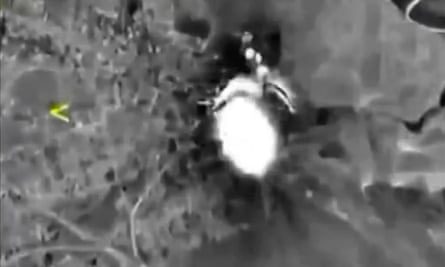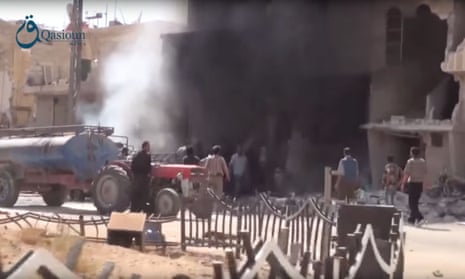“Brother, the Russian fighters are in our sky right now,” said Tarek Balsha, as he spoke from his home in Hama province, near the Ghab plain. “By God, I just heard it.
“There’s just a hill separating us. We men have gotten used to this, but we fear for our women and children. Our fear for them never leaves us.”
It is a sentiment shared throughout Syria’s opposition-held territories. Terrorised for years by the prospect of crude barrel bombs launched by a regime that has sought to collectively punish those who live under rebel rule, they now face the prospect of more precise, but destructive Russian bombs.
The Russian intervention in Syria is more expansive than its initial stated goal of targeting Islamic State, the terror group that controls vast swaths of eastern and northern Syria. Vladimir Putin’s military operations appear aimed at a wider foe – opposition groups who have wrested control of large amounts of territory from the Assad regime and who are inching closer to his strongholds in central and western Syria, as well as Jabhat al-Nusra, al-Qaida’s wing in the country.
Russian jets have bombed targets in the provinces of Homs, Hama, Idlib and Aleppo, in areas where Isis has no major presence, and where opposition groups, including some backed by the US and Gulf states, hold sway.
Terrified residents of affected areas increasingly believe the US has reached a tacit agreement with Russia to preserve the Assad regime. There is also increased sympathy for al-Qaida and its message of American weakness.
“God be with us, they’ve been flying all day yesterday, they sound different than the Syrian planes,” said Mohammad, from Maarat al-Numan, a town in Idlib province, which was struck by Russian aircraft. “Everyone is scared because now we see two planes in the sky at a time, one Syrian and one Russian, as if they’re practicing.
“The people know now that it is a war against Syrians.”
A coalition of rebels, known as Jaysh al-Fateh, took control of most of Idlib in a multistage offensive last spring. The coalition includes Jabhat al-Nusra, but Isis has no known presence in the province. The airstrikes in both Idlib and Hama targeted rebel positions belonging to the coalition, as well as fighters in the moderate opposition backed by the US and the Gulf states who are active in the area.
A member of the local governing council in Daarat al-Izza, a town in Aleppo thatwas hit on Friday, said they have not had an Isis presence for a year and a half. The attack targeted a communication centre at the edge of the town belonging to one of the opposition factions. “It’s a fearsome sound,” he said. “We’re at the start of the school year and there’s clear fear in the streets. We have canceled Friday prayers, public markets and any large gatherings.”

“The goal of the Russian planes isn’t Daesh [Isis] or Jabhat al-Nusra, their target is every fighter in the Levant,” said one religious official with Jaysh al-Fateh. “This flagrant intervention is aimed at supporting Assad under the guise of fighting terrorism.”
“People are angry and boiling. Some are fearful because Russian aircraft are more potent and destructive and modern, but most have just resigned themselves to God, it’s like they’re immune after the training they got under Syrian planes. They’ve acclimatised to the planes.”
The official added that the airstrikes were bolstering the popularity of Jabhat al-Nusra, with its combined message of American duplicity against Muslims and the prospect of fighting an old foe – many of al-Qaida’s veterans once fought the Soviet Union in Afghanistan.
In Talbiseh in northern Homs, religious officials cancelled the weekly Friday prayers after Russian jets bombed the area, allegedly killing about 18 civilians and wounding 65 people.
“We warn against the continuation of this campaign which will lead to a humanitarian catastrophe because the area is filled with civilians and refugees from nearby areas and we are out of medical supplies,” the local hospital said in a statement. “Operations to save victims trapped under the rubble continued until late at night, showing the destructive power of the weapons used.”
It is a predicament that many in Syria have become used to.
“Those who haven’t fled in five years of airstrikes won’t flee now,” said Mohammad, as he described a plume of smoke from the nearby Idlib town of Habit after an airstrike. “People have realised that if they flee every time there’s a battle or bombing it won’t end. So they’ve gotten used to the bombings and say if we’re going to die, at least we die in our homes.”
